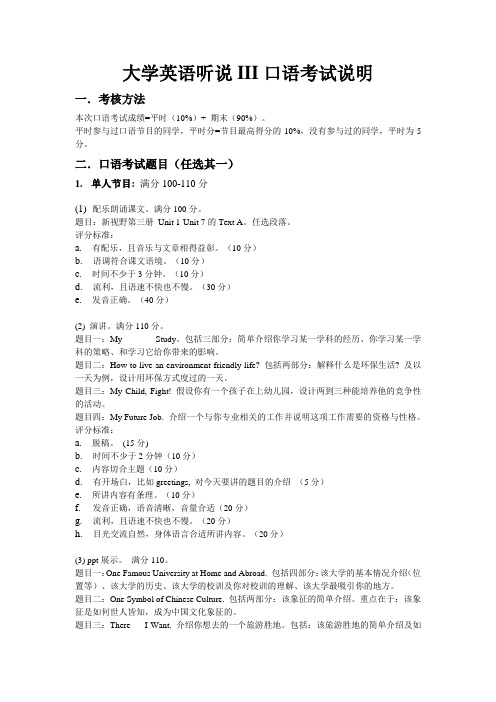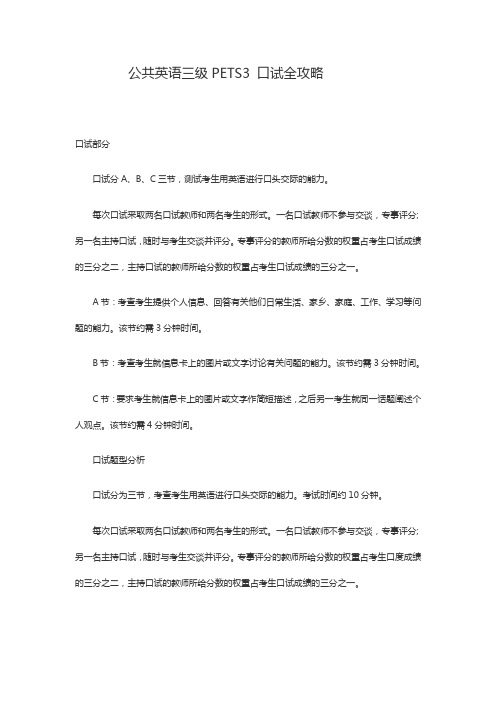大英3(视听说)口语考试方式及复习范围
大学英语听说III口语考试说明

大学英语听说III口语考试说明一.考核方法本次口语考试成绩=平时(10%)+ 期末(90%)。
平时参与过口语节目的同学,平时分=节目最高得分的10%,没有参与过的同学,平时为5分。
二.口语考试题目(任选其一)1.单人节目: 满分100-110分(1)配乐朗诵课文。
满分100分。
题目:新视野第三册Unit 1-Unit 7的Text A。
任选段落。
评分标准:a.有配乐,且音乐与文章相得益彰。
(10分)b.语调符合课文语境。
(10分)c.时间不少于3分钟。
(10分)d.流利,且语速不快也不慢。
(30分)e.发音正确。
(40分)(2) 演讲。
满分110分。
题目一:My ______ Study。
包括三部分:简单介绍你学习某一学科的经历、你学习某一学科的策略、和学习它给你带来的影响。
题目二:How to live an environment-friendly life? 包括两部分:解释什么是环保生活? 及以一天为例,设计用环保方式度过的一天。
题目三:My Child, Fight! 假设你有一个孩子在上幼儿园,设计两到三种能培养他的竞争性的活动。
题目四:My Future Job.介绍一个与你专业相关的工作并说明这项工作需要的资格与性格。
评分标准:a.脱稿。
(15分)b.时间不少于2分钟(10分)c.内容切合主题(10分)d.有开场白,比如greetings, 对今天要讲的题目的介绍(5分)e.所讲内容有条理。
(10分)f.发音正确,语音清晰,音量合适(20分)g.流利,且语速不快也不慢。
(20分)h.目光交流自然,身体语言合适所讲内容。
(20分)(3) ppt展示。
满分110。
题目一:One Famous University at Home and Abroad.包括四部分:该大学的基本情况介绍(位置等)、该大学的历史、该大学的校训及你对校训的理解、该大学最吸引你的地方。
题目二:One Symbol of Chinese Culture.包括两部分:该象征的简单介绍。
大学英语视听说3 大纲

安徽外国语学院课程教学大纲一、课程基本信息二、课程教学目的英语视听说课程的教学目的是培养学生扎实的语言基本功和听说专业技能,即加强学生英语听力能力的同时着重发展学生的英语听说能力。
使学生在今后的工作和社会交往中能用英语有效地进行口头信息交流,同时培养和训练学生自主学习能力,提高综合文化素养,以适应我国社会发展和国际交流的需要,使学生能够真正具有良好的国际交流能力。
三、课程教学要求本课程教学大纲在教学要求上分为一般要求阶段(一年级)和较高要求阶段(二年级),本课程属于较高要求阶段。
现将本课程的教学要求规定如下:1、词汇:通过本课程的学习,学生的词汇量应应达到4500个单词和700个词组,其中2000个单词和500个词组为积极词汇,即要求学生能够在认知的基础上学会熟练运用,包括口头表达以及书面表达两个方面。
2、语法:巩固和加深基本语法知识,提高在语篇水平上运用句法结构的能力。
3、听的能力:能听懂英语讲课内容,能听懂一般性英语谈话和一般性题材讲座。
能基本听懂英语国家慢速英语教学节目,语速为每分钟130词左右,能掌握其中大意,抓住要点和有关细节。
能运用基本的听力技巧帮助领会讲话者的观点和态度。
4、说的能力:能在学习过程中与老师、同学进行交流,并能就某一主题进行讨论。
能就日常话题和来自英语国家的人士进行交谈。
能就所熟悉的话题经准备后作简短发言,表达比较清楚,语音、语调基本正确。
能在交谈中使用基本的会话策略。
四、课程教学内容和学时安排五、教学内容Unit 1 Access to Success1. Teaching ObjectivesTalk about SuccessTake notes by using a keyword outlineRefer to what you said earlierTalk about a challenge / an achievementHave a basic understanding of public speaking2. Key PointsHow to grasp the listening skill: note-taking by using a keyword outlineHow to grasp the speaking skill: refer to what you said earlierImportant and useful words and expressions3. Difficult PointsMastering the listening skill: note-taking by using a keyword outlineMastering the speaking skill: refer to what you said earlierContent1.Opening up2. Listening to the world1) Sharing: How do they feel about trying new things?What stops them from trying new things?What have they achieved in their life that makes them feel proud?Who do they admire in terms of achievements and why?2) Listening: before listening; while listening; after listening3) Viewing: before viewing; while viewing; after viewing3. Speaking for 3communication1).Role-play2).Speaking skills: Referring to what you said earlier3).Group discussion: The most impressive challengea.Get ideasb.Discuss and organize ideasc.Present ideas4. Further practice in listening1) Short conversations2) Long conversation3) Two passages5. Wrapping upUse the following self-assessment checklist to check what you have learned in this unit.6. CET-6 Training: Vocabulary1) The importance of enlarging one’s vocabulary2) Skills for memorizing vocabulary3) Analysis with examples4) CET-6 model listening trainingUnit 2 Emotions speak louder than words1. Teaching ObjectivesTalk about different emotionsGet familiar with the usage of problem-solution pattern.Know some signal words2. Key PointsHow to grasp the listening skill:Predict the theme and relevant vocabulary before you listenGrasp some signal words3. Difficult PointsThe usage of the problem-solution patternThe understanding of the organization of a speechThe usage of organizing ideasContent1.Opening up2. Listening to the world1) Sharing: How are they feeling today? Why?Would you describe yourself as an optimist or a pessimist? Why?What’s the best thing that’s happened to you this year?2) Listening: before listening; while listening; after listening3) Viewing: before viewing; while viewing; after viewing3. Speaking for communication1).Role-play2).Speaking skills: Overall organization of a speech3).Group discussion: The most impressive experiencea.Get ideasb.Discuss and organize ideasc.Present ideas4. Further practice in listening1) Short conversations2) Long conversation3) Two passages5. Wrapping upUse the following self-assessment checklist to check what you have learned in this unit.6. CET-6 Training: Listening for Conversations1) Skills for listening to conversations2) Analysis with examples3) CET-6 model listening trainingUnit 3 Love your neighbor1. Teaching ObjectivesTalk about neighbors and communitiesDistinguish fact from opinion in listeningLearn how to tell a story2. Key PointsTalk about planning a communityKnow the rules of about language use in public speakingUseful expressions3. Difficult PointsHow to grasp the specific informationHow to distinguish fact from opinion in listeningHow to learn public speaking skillsContent1. Opening up2. Listening to the world1) Sharing: Do you know your neighbors? How well do you know them?What do you think makes a good/bad neighbor?2) Listening: before listening; while listening; after listening3) Viewing: before viewing; while viewing; after viewing3. Speaking for communication1).Role-play2).Speaking skills: language in public speaking3).Group discussion: Way of planning a new communitya.Get ideasb.Discuss and organize ideasc.Present ideas4. Further practice in listening1) Short conversations2) Long conversation3) Two passages5. Wrapping upUse the following self-assessment checklist to check what you have learned in this unit.6. CET-6 Training: Listening for Long Conversations1) Skills for listening to long conversations2) Analysis with examples3) CET-6 model listening trainingUnit 4 What’ s the Big Idea?1.Teaching ObjectivesTalk about inventions and creative ideasPredict the theme and relevant vocabulary before you listenPropose ideas and comment on ideas while brainstorming2.Key PointsHow to grasp the listening skill:Predict the theme and relevant vocabulary before you listenHow to grasp the speaking skill: brainstorming3.Difficult PointsLearn to use voice, body language and visual aids in speech deliveryThe understanding of the organization of a speechThe usage of organizing ideasContent1. Opening up2. Listening to the world1) Sharing: What items do they enjoy buying most?What sorts of things do they buy on impulse?What recent product or service do they think is impressive?2) Listening: before listening; while listening; after listening3) Viewing: before viewing; while viewing; after viewing3. Speaking for communication1).Role - play2).Speaking skills: Making guesses3).Group discussion: Your business ideasa.Get ideasb.Discuss and organize ideasc.Present ideas4. Further practice in listening1) Short conversations2) Long conversation3) Two passages5. Wrapping upUse the following self-assessment checklist to check what you have learned in this unit.6. CET-6 Training: Listening for Passages1) Skills for listening to passages2) Analysis with examples3) CET-6 model listening trainingUnit 5 More than a paycheck1.Teaching ObjectivesTalk about different jobsListen for contrastManage a meeting/discussion2.Key PointsHow to master different kinds of jobsHow to get familiar with the topic of managing a meeting3.Difficult PointsHow to grasp the specific informationHow to listen for contrastHow to learn public speaking skillsContent1. Opening up2. Listening to the world1)Sharing: Have you ever considered the potential disadvantages of your dream job? Are you prepared to accept them when you take the job?Suppose you see your dream job advertised. Unfortunately, it asks for several specific skills and you’ve only got some of them. What would you probably?2) Listening: before listening; while listening; after listening3) Viewing: before viewing; while viewing; after viewing3. Speaking for communication1).Role-play2).Speaking skills: Managing a meeting3).Group discussion: Talk about a typical day in lifea.Get ideasb.Discuss and organize ideasc.Present ideas4. Further practice in listening1) Short conversations2) Long conversation3) Two passages5. Wrapping upUse the following self-assessment checklist to check what you have learned in this unit.6. CET-6 Training: Listening for Recordings of Lectures or Talks1) Skills for listening to recordings of lectures and or talks2) Analysis with examples3) CET-6 model listening trainingUnit 6 Histories make men wise1. Teaching ObjectivesTalk about important events and people in historyMake inferencesExpress uncertaintyTalk about an imaginary historyMake an informative speech in chronological or spatial order2. Key PointsHow to master the history of different periodsHow to get familiar making inferencesUseful expressions3. Difficult PointsHow to grasp the specific informationHow to express uncertaintyHow to make an informative speech in chronological or spatial orderContent1. Opening up2. Listening to the world1)Sharing: Do you think life better know than in the past?If you could have lived through a different age or decade, which would you choose and why?2) Listening: before listening; while listening; after listening3) Viewing: before viewing; while viewing; after viewing3. Speaking for communication1)Role-play2)Speaking skills: Expressing uncertainty3)Group discussion:What would have happened if Zheng He had reached the Americas first?a.Get ideasb.Discuss and organize ideasc.Present ideas4. Further practice in listening1) Short conversations2) Long conversation3) Two passages5. Wrapping upUse the following self-assessment checklist to check what you have learned in this unit.6. CET-6 Training: Listening for News Reports1) Skills for listening to news reports2) Analysis with examples3) CET-6 model listening training。
英语三级口语考试内容

英语三级口语考试内容英语口语考试是对学生英语口语能力的一次全面检测,它包括了听力、口语、交际能力等多个方面。
在口语考试中,考官会根据学生的发音、语法、词汇运用、流利度、交际能力等方面进行评分。
因此,学生在备考口语考试时需要全面提高自己的英语口语能力,下面将为大家详细介绍英语三级口语考试内容。
首先,英语三级口语考试内容包括日常对话、情景交际、演讲等多个方面。
日常对话部分主要考察学生在日常生活中的交际能力,考生需要能够流利地进行自我介绍、问路、购物、订餐等日常交际对话。
情景交际部分主要考察学生在特定情景下的交际能力,如在医院、银行、机场等场景下的对话能力。
演讲部分主要考察学生的口头表达能力,考生需要能够就某个话题进行自由发挥,表达自己的观点和看法。
其次,英语三级口语考试内容还包括了听力理解能力的考察。
在口语考试中,考官会播放一段录音,考生需要仔细听取内容,并根据所听内容进行回答或对话。
这部分考试主要考察学生对英语语音的理解能力,以及对所听内容的准确把握和回答能力。
另外,英语三级口语考试内容还包括了口语表达的语法、词汇运用。
在口语考试中,考官会对考生的口语表达进行严格的语法和词汇检查,考生需要能够准确地运用英语语法和词汇进行口语表达,避免出现明显的语法错误和词汇搭配错误。
最后,英语三级口语考试内容还包括了交际能力的考察。
在口语考试中,考官会通过与考生进行对话来考察考生的交际能力,包括了语速、语调、表情、姿势等方面。
考生需要能够自然流畅地进行口语交流,表现出良好的交际能力。
总之,英语三级口语考试内容涵盖了日常对话、情景交际、演讲、听力理解、语法词汇运用和交际能力等多个方面。
在备考口语考试时,考生需要全面提高自己的英语口语能力,包括了语音、语法、词汇、交际能力等方面,才能顺利通过口语考试。
希望以上内容对大家有所帮助,祝大家取得优异的口语成绩!。
视听说3考试事项说明

视听说3:(课本上的考试范围:前6个单元内所有的听力材料)
一.单选题(来源:课外的听力资源)
短对话+长对话+短文,共25小题,每题2分,共50分。
二.T or F (来源:课本上的听力材料)
2个短文,共10小题,每小题2分,共20分。
三.填空(来源:课本上的听力材料)
2个短文,共15小题,每小题2分,共30分。
其它:第一和第二题只听一遍,第三题每个短文听三遍。
考试共35分钟。
读写3:(课本上的考试范围:前5个单元)
Part I V ocabulary and Grammar (1’*15=15’)(来源:书上的考点)Part II Reading Comprehension (2*20=40’)(来源:课外材料)4篇短文
Part III Translation ( 3*5=15’)(来源:书上的习题;课文中的句子)含英翻中和中翻英。
Part IV Writing ( 30’)
考试时间为1小时40分钟
软件3:
I Listening Comprehension(20 分)
Section A 短对话
Section B 3篇短文或1篇复合式听写
II V ocabulary
20小题,每题0.5分,共10分
III Reading Comprehension
3篇,共15小题,每题2分,共30分
IV Translation
5小题,含英翻中和中翻英。
每题4分,共20分
V Composition (20 分)
口语3(考查:普本和软件口语试卷相同)。
大学英语3口语测试方案(草拟)

重庆邮电大学移通学院14-15学年第一学期大学英语3期末口语考试命题原则1.命题标准大学英语(3)课程是本科非英语专业大学一年级第一学期开设的一门公共基础课程,共4学分,理论学时64学时。
根据重邮移通学院应用性人才的培养目标,大学英语课程注重知识到能力的转化,强调英语综合应用能力的培养,实施过程评价与终结评价的结合。
由此,本学期大学英语2课程拟在学生学期成绩评定方面尝试变革,加入口试部分。
考试命题标准参照全日制普通高校同层次、同课程的本科水平,并体现三本学生培养应用型人才为主要目标的特点。
在口试难度上保证中等水平的考生能够在规定的考核时间内完成全部口试任务。
2.考试依据和范围以《大学英语课程教学要求》以及课程组制定的课程教学大纲和考试大纲为依据,题目涵盖本学期教学计划规定的课堂教学内容和学生课外自主学习内容,包括全新版大学英语(第二版)综合教程3的1-4单元、全新版大学英语(第二版)听说教程3的1-6单元的关键话题和对话内容。
3.知识与能力的关系大学英语(3)课程教学既要注重对词汇和语言点的理解和掌握,又要注重语言实际应用能力的培养。
本次口试命题以语言实际应用为考查点,测试了学生对英语口语的掌握情况和语言的灵活运用能力,包括两个部分:小型演讲和生生对话。
每个部分具体的考查范围和分值如下:第一部分:小型演讲(Mini-speech)(50分):测试时间2到3分钟。
要求两名学生分别就以下题目进行小型演讲,每位同学演讲时间不超过1.5分钟:1.Which do you prefer, urban life or rural life?2.Which one you prefer, high school life or university life?3.What do you need to prepare before a job interview?4.Do you agree with the death penalty? Why?5.What is the role of creativity in children’s education?第二部分:生生对话(Conversation)(50分):两位同学共同的测试时间不超过3分钟。
大学英语(三)口语考试内容及具体要求

大学英语(三)口语考试内容及具体要求
(2013-2014学年第一学期;适用对象:2012级高中本)1.辽东学院大学英语(本科)课程考核改革实施方案(部分)
第三级主要测试学生的语言表达能力及交际能力。
考试内容围绕读写教程第三册课文主题及视听说课的主题,参考视听说课中的模板,组织对话,并就相关主题陈述正或反方向的观点,其中对话5分,观点陈述5分。
2.考试内容
大学英语(三)中的对话取材于《视听说教程(三)》中每单元的IV. Speak Out NowYour Turn, 1, 具体页码如下 : (Unit 1:P12) (Unit 2:P30) (Unit3 :P48) (Unit4 :P66) (Unit5: P84) (Unit6: P102) (Unit7:P120) (Unit 8 :P138) (Unit9 :P156) (Unit10: P174)。
本学期期末考试新题型201310
选词填空(书后第五大题,顺序打乱);长篇阅读(参照四级新题型);篇章阅读;汉译英(句子翻译和段落翻译);材料作文(看图作文)。
公共英语三级PETS3 口试全攻略

公共英语三级PETS3 口试全攻略口试部分口试分A、B、C三节,测试考生用英语进行口头交际的能力。
每次口试采取两名口试教师和两名考生的形式。
一名口试教师不参与交谈,专事评分;另一名主持口试,随时与考生交谈并评分。
专事评分的教师所给分数的权重占考生口试成绩的三分之二,主持口试的教师所给分数的权重占考生口试成绩的三分之一。
A节:考查考生提供个人信息、回答有关他们日常生活、家乡、家庭、工作、学习等问题的能力。
该节约需3分钟时间。
B节:考查考生就信息卡上的图片或文字讨论有关问题的能力。
该节约需3分钟时间。
C节:要求考生就信息卡上的图片或文字作简短描述,之后另一考生就同一话题阐述个人观点。
该节约需4分钟时间。
口试题型分析口试分为三节,考查考生用英语进行口头交际的能力。
考试时间约10分钟。
每次口试采取两名口试教师和两名考生的形式。
一名口试教师不参与交谈,专事评分;另一名主持口试,随时与考生交谈并评分。
专事评分的教师所给分数的权重占考生口度成绩的三分之二,主持口试的教师所给分数的权重占考生口试成绩的三分之一。
A节:考查考生提供个人信息、回答有关他们日常生活、家乡、家庭、工作、学习等问题的能力。
该节约需3分钟时间。
B节:考查考生就信息卡上的图片或文字讨论有关问题的能力。
该节约需3分钟时间。
C节:要求考生就信息卡上的图片或文字作简短描述,之后另一考生就同一话题阐述个人观点。
该节约需4分钟时间。
说明:如果某考点的实考人数为单数,最后一组考生人数为三人。
这种形式的考试所用材料与两名考生的形式基本相同。
3人组的考试时间为16分钟:A 节5分钟,B节5分钟,C节6分钟。
口试应试技巧世上没有终南捷径,也没有不付出努力就可以成功的事情,之所以要在这里提供口试技巧与应试指导有道是四两拨千斤,如果方法用得巧,不仅可以节省大量的无谓的时间和精力,而且可以大大提高过级成功的机率。
以下是一些我个人在主考口试的过程中,发现的一些问题,其中也有好多内容是来自一些成功通过口试的考生的经验及体会,以及他们平时是如何准备口试考试的分享。
大学英语视听说3

《大学英语视听说3》课程教学大纲一、基本信息二、课程简介(不超过300字)《大学英语视听说》课程教学旨在提高学生英语听说的交际能力。
本课程结合了听力、口语课程的一些基本功能,通过对学生进行听力、口语等英语视听说技能的训练,提高学生的听力理解水平、口语表达能力和对语言运用的分析理解能力。
以英语录音、录像、电影电视片等形式进行教学,经过系统的训练,使学生有较好的语言实际运用的能力和较强的视听说水平,同时增强其自主学习能力、提高综合文化素养,使他们在今后的工作和社会交往中能用英语有效进行口头和书面的交流。
三、知识点(一)基本知识点培养学生的英语综合(特别是听说)的应用能力,切实提高学生综合文化素养和跨文化交际的能力,以适应社会发展和国际交流的需要;同时增加听说学习策略的指导,强化学生自主学习的意识。
1. 英语语言知识,包括:英语语音,英语词汇,英语语法,英语修辞等等。
2. 中西方文化知识3. 听力技巧,口语表达策略,快速记录策略速等(二)重要知识点语音知识,语法知识、文学知识、文化知识四、基本要求(一)知识要求能听懂英语讲课,并能听懂题材熟悉、句子结构比较简单、基本没有生词、语速为每分钟110-120词的简短会话、谈话、报道和讲座,掌握其中心大意,抓住要点和有关细节,领会讲话者的观点和态度。
能就教材内容和适当的听力材料进行回答和复述,能用英语进行一般的日常会话,能就所熟悉的话题经准备后作简短发言,表达思想比较清楚,语音、语调基本正确。
(二)能力要求注重培养和提高学生的个性化学习及自主学习能力、自我发展能力和可持续性发展能力;营造个性化学习的环境,为学生提供自主学习的资源和场所,在培养他们积极主动的学习方法和思维方法、助其形成有效的学习策略的同时,提高他们的创新意识、创新能力、应用能力、分析和解决问题能力。
(三)素质要求应坚持以人为本,关注学生的情感,进一步激发学生学习英语的兴趣,帮助学生建立英语学习的成就感和自信心。
- 1、下载文档前请自行甄别文档内容的完整性,平台不提供额外的编辑、内容补充、找答案等附加服务。
- 2、"仅部分预览"的文档,不可在线预览部分如存在完整性等问题,可反馈申请退款(可完整预览的文档不适用该条件!)。
- 3、如文档侵犯您的权益,请联系客服反馈,我们会尽快为您处理(人工客服工作时间:9:00-18:30)。
大英3(视听说)口语考试方式及复习范围
考试对象:2015级大学英语3(视听说)(生物制药专业0601404/5班)
本课程的教学目的是为达到《大学英语课程教学要求》正式版相关规定的“基础要求”,而为学生打下扎实的语言基础。
本学期的学习重点是强化语音和语调等基础知识,同时培养学生连贯的表达能力等综合应用英语的能力,使他们在今后学习、工作和社会交往中能用英语有效地进行交际,同时增强其自主学习能力,提高综合文化素养,以适应我国社会发展和国际交流的需要。
一.命题基本原则
本次考试为期末诊断性测试, 目的是全面检测本学期视听说教学中,语音部分及口语运用情况的教学效果及学生的课后自主学习情况, 以促进课堂教学和学生课后学习,有效提高学生的口语表达和实际运用能力。
考题基于本学期的教学内容和学生课后学习任务。
命题遵循以下原则:
科学性与公平性。
遵循教学规律,根据《新世纪大学英语视听说教程3》的要求,合理分配语音与话题讨论的分值分配比例,重点考察学生的语音、语调及基本口语表达能力。
全面性。
综合考虑教学大纲和教学计划的内容以及在教学过程中的实际情况,口语测试要能反映课程关于语音和口语运用方面的主要教学内容和教学要求。
难易度合理。
根据课程具体内容和教学要求,合理确定试题的难易程度,避免出生僻词汇、边缘词汇以及复杂、非常规语法结构及口语表达句型。
题量适度。
根据课程特点和教学内容要求确定各类题型的数量,确保90%以上学生能够在规定时间内完成口语考试任务,并达到预期效果。
二.命题范围
《新世纪大学英语视听说教程3》(Units 1-6)中的核心单词以及教材对话或短文中的部分英文句子。
三. 试题构成
1.单词及句子朗读,共5分
(1)正确朗读所给单词并说出单词的中文意思,2分。
命题范围:《新世纪大学英语视听说教程1》(Units 1-6)中的核心单词,共计10个单词。
(2)正确朗读所给句子,注意发音、语调及语义停顿,3分。
命题范围:《新世纪大学英语视听说教程3》对话或短文中的部分英文句子,共计5个句子。
2. 话题讨论,共计5分
命题范围:根据《新世纪大学英语视听说教程3》(Units 1-6)中的话题,选取5个话题。
3. 考试形式
考生自行组合,两人一小组,自行从教师所给的口语话题里选择一个提前准备。
考试时,每位考生朗读抽取到的试题语音部分,待一组的考生分别朗读完毕后,由两名考生对之前自己选择的口语话题进行2-3分钟的讨论,讨论完毕,由教师进行评分,并记录。
四.评分标准
本次考试总分为10分,语音部分5分,话题讨论5分。
具体评分标准如下:
复习范围:
一、语音部分
(一)单词朗读:正确朗读所给单词并说出单词的中文意思。
Unit 1
baggage attendant remote turbulence destination vegetarian helicopter confirm
wallet check
Unit 2
barbecue alarm burglar vacuum conditioner detector crosswalk pedestrian landscape high-tech
Unit 3
grown-up childish accomplished incredible supervise pregnancy accustomed assimilate
aspiration transfer
Unit 4
allergic insomnia infection indigestion bandage alcoholic acupuncture skeptical dizzy
sneeze
Unit 5
competitive reject recommendation interview neighborhood witness homesick cafeteria
specialize scholarship
Unit 6
redial frustrated budget emergency co-worker convenient browse privacy
reunion message
(二)句子朗读:正确朗读所给句子,注意发音、语调及语义停顿。
Unit 1
Before you arrive at the airport for your flight, you go to the check-in counter first. (P5)
After the flight is over, you go to the baggage claim area to get your luggage.(P5)
Before going on a trip I pay the bills, I empty the trash, and i give a house key to a friend.(P15
Video track 3-1-1)
Unit 2
The house contains one dining room, one living room, one master bedroom, and two more
bedrooms. (P32)
You may not take more than four books out of the library at a time.(P38)
I’m not allowed to play music that’s too loud so that it might disturb other people.(P39 Video
Track 3-2-4)
Unit 3
Refugees are people who leave their countries to escape war or other problems.(P48 Audio Track 3-3-3)
Some of them are minor, such as uncomfortable air conditioning or a loudly ringing telephone. (P51 Audio Track 3-3-10)
Roberto was excited, but he was a bit nervous about learning a new software program.(P65 Audio Track 3-3-17)
Unit 4
If you usually have coffee in the morning, go for a walk or do exercises instead.(P70 Audio Track 3-4-9)
We all know that good habits bring good health, but we don’t realize how much difference they can make.(P70 Audio Track 3-4-10)
Unit 5
I researched several universities but decided on this one because it has strong links with many multinational businesses.(P89 Audio Track 3-5-1)
If he doesn’t get into graduate school, Takeshi will apply again. (P 104 Audio Track 3-5-3)
Unit 6
She advised him to look in the phone directory, but he man said he couldn’t find it there. (P110 Audio Track 3-6-3)
What i don’t like about cell phones is when they ring at the most unexpected times.(P120 Video Track 3-6-2 )
二、话题讨论
1.Why do people like travelling?What significant role cantravelling play in a person’s life?
2.When you go on vacation, which do you prefer: a simple place with few luxuries or a fully furnished luxury house? Why?
3.What should we do if we want to have a meaningful college life?
4.Do you think health is more important than good grades or a successful career? Why or why not?
5.What do we need to learn in university besides knowledge?。
